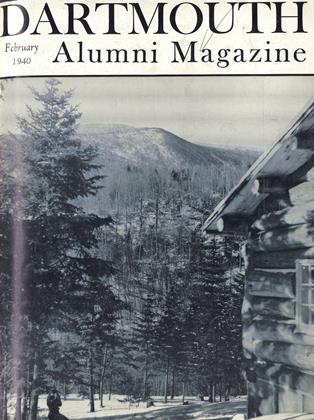1939-Published by the Cummington Schoolat the Kraushar Press, Northampton,Mass. 25c.
Of the four poets in this little pamphlet, two are recent Dartmouth graduates: Samuel French Morse '36, and William Bronk Jr. '38. Both are careful, precise writers, both are doing distinguished work, though not, as yet, major. Indeed, Morse and Bronk take the honors for this publication, although the other two poets, Harry Duncan and Jane Ward, are represented by decidedly good poems.
Morse's poem, "End of a Yearis a sharply defined, well-plotted experience in the metaphysics of nature. It accomplishes a synthesis of vital living and sound thought with skilful dexterity. Morse has. felt the acute turn of the mind, the swift realization of tremendous power: "So, when stormsTurn with the sudden logic of a dream,We are restless, and unsure, and fear adeathWe do not understand."
Morse is sure of his own ground, sure of his own direction. Poems like the present one are worth a careful reading; but it may be that such work is limited in appeal. He is still somewhat of the poet's poet.
Bronk contributes two poems; the first of which, "Pause Before Spring" is the best of all in the pamphlet. His ability to be profound whilst seeming casual may lead hasty readers to judge him light, unimportant; but it is the mark of a good poet. He has caught an exciting moment of experience, and brought us up to the ground-rise from which we may see it too. But in the experience, in the special selection he has made, in the vividness of the image, in the recaptured moment there is a meaning:
"Whatever is ice or water holds its ground:No melted snow crusts over, no morethaws.
Between themselves the times create suspense."
In "The Concert of the Ancietit Instruments" Bronk indicates a versatility of phrase, a sharp, quick touching of the hem of the cosmos. Perhaps a little too private, a little too indefinite of idea, the poem is nevertheless sure and concentrated.
Both Morse and Bronk are inclined to transform their experience into a philosophical exactness; and because of that, they are still minor, still without the reach of the mind that can translate poetry into life with immediate skill. But these two poets are important to Dartmouth; important as among the four or five graduates of the last twenty years who have shown the ability to write well and seriously. They may not become major poets; but they will never compromise.
 View Full Issue
View Full Issue
More From This Issue
-
 Article
ArticleMore Than Professor
February 1940 By JOHN HURD JR. '21 -
 Article
ArticleThe College In The Sixties
February 1940 -
 Class Notes
Class Notes1915*
February 1940 By CHARLES R. TAPLIN -
 Article
ArticleEducation Without Books
February 1940 By Davis Jackson '36 -
 Sports
SportsBig Green Teams
February 1940 By Whitey Fuller '37 -
 Article
ArticleHanover Browsing
February 1940 By HERBERT F. WEST '22
Edward Fritz '40
-
 Article
ArticleWith the Outing Club
December 1939 By Edward Fritz '40 -
 Article
ArticleWith the D.O.C.
January 1940 By Edward Fritz '40 -
 Article
ArticleWith the Outing Club
February 1940 By Edward Fritz '40 -
 Article
ArticleCLUB HOUSE REMODELED
February 1940 By Edward Fritz '40 -
 Article
ArticleSKATING TEACHER JOINS STAFF
February 1940 By Edward Fritz '40 -
 Article
ArticleBOYS' CAMP PLANNED
February 1940 By Edward Fritz '40
Books
-
 Books
BooksTHE LIFE AND WRITINGS OF JOHN BUNYAN
FEBRUARY 1929 By A. W. Vernon -
 Books
BooksIt Matters
September 1980 By D.A.D. -
 Books
BooksPIRATES PURCHASE
JANUARY 1932 By E. P. K. -
 Books
BooksThe Shared Life
APRIL 1983 By Elise Boulding -
 Books
BooksThe Start of It All
September 1975 By J.H. -
 Books
BooksCONTEMPORARY UNIONISM IN THE UNITED STATES
January 1949 By Ross Stagner

